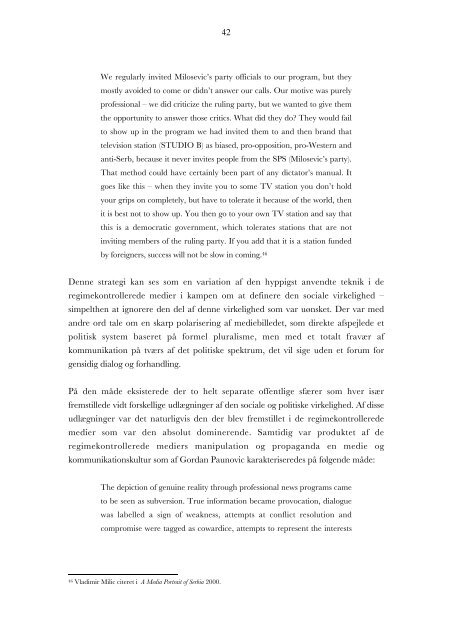et illiberalt demokrati - hofhr
et illiberalt demokrati - hofhr
et illiberalt demokrati - hofhr
Create successful ePaper yourself
Turn your PDF publications into a flip-book with our unique Google optimized e-Paper software.
42<br />
We regularly invited Milosevic’s party officials to our program, but they<br />
mostly avoided to come or didn’t answer our calls. Our motive was purely<br />
professional – we did criticize the ruling party, but we wanted to give them<br />
the opportunity to answer those critics. What did they do? They would fail<br />
to show up in the program we had invited them to and then brand that<br />
television station (STUDIO B) as biased, pro-opposition, pro-Western and<br />
anti-Serb, because it never invites people from the SPS (Milosevic’s party).<br />
That m<strong>et</strong>hod could have certainly been part of any dictator’s manual. It<br />
goes like this – when they invite you to some TV station you don’t hold<br />
your grips on compl<strong>et</strong>ely, but have to tolerate it because of the world, then<br />
it is best not to show up. You then go to your own TV station and say that<br />
this is a democratic government, which tolerates stations that are not<br />
inviting members of the ruling party. If you add that it is a station funded<br />
by foreigners, success will not be slow in coming. 46<br />
Denne strategi kan ses som en variation af den hyppigst anvendte teknik i de<br />
regimekontrollerede medier i kampen om at definere den sociale virkelighed –<br />
simpelthen at ignorere den del af denne virkelighed som var uønsk<strong>et</strong>. Der var med<br />
andre ord tale om en skarp polarisering af mediebilled<strong>et</strong>, som direkte afspejlede <strong>et</strong><br />
politisk system baser<strong>et</strong> på formel pluralisme, men med <strong>et</strong> totalt fravær af<br />
kommunikation på tværs af d<strong>et</strong> politiske spektrum, d<strong>et</strong> vil sige uden <strong>et</strong> forum for<br />
gensidig dialog og forhandling.<br />
På den måde eksisterede der to helt separate offentlige sfærer som hver især<br />
fremstillede vidt forskellige udlægninger af den sociale og politiske virkelighed. Af disse<br />
udlægninger var d<strong>et</strong> naturligvis den der blev fremstill<strong>et</strong> i de regimekontrollerede<br />
medier som var den absolut dominerende. Samtidig var produkt<strong>et</strong> af de<br />
regimekontrollerede mediers manipulation og propaganda en medie og<br />
kommunikationskultur som af Gordan Paunovic karakteriseredes på følgende måde:<br />
The depiction of genuine reality through professional news programs came<br />
to be seen as subversion. True information became provocation, dialogue<br />
was labelled a sign of weakness, attempts at conflict resolution and<br />
compromise were tagged as cowardice, attempts to represent the interests<br />
46 Vladimir Milic citer<strong>et</strong> i A Media Portrait of Serbia 2000.


